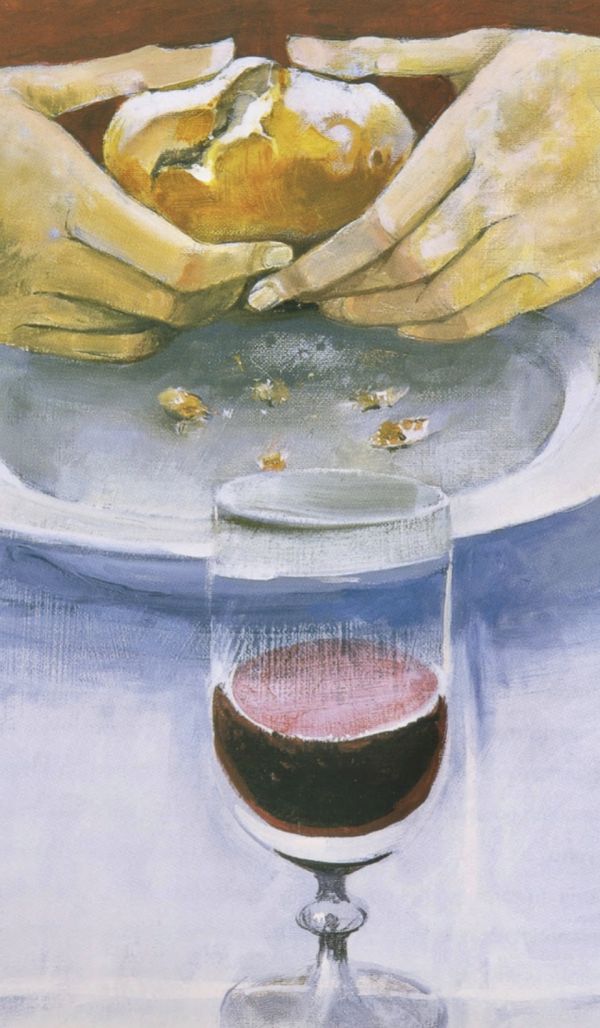Corpus Domini
(Lk 9:11b-17)
The Second Vatican Council didn’t spend a single word about the many Eucharistic devotions.
To make us fully understand the Person of Christ, the Council Fathers were well aware that Jesus did not leave a statue or a relic.
He preferred to express Himself in a gesture, which challenges us.
In the Jewish world, in the evening each family met around for meal, and that of breaking bread was the most significant moment in their experience of conviviality (and memory of the delivery of self to others).
The only bread was divided and shared among all the family members - but even a poor hungry man could look out at the door, which should not be tightened.
Bread and wine, products that had assimilated the energies of heaven and earth, were perceived with spiritual sensitivity - gifts of the Creator for the life and joy of humanity.
In that culture, bread is basic food. But our life is complete only if there is also the element of celebration: here is wine.
Even today bread is not cut with a knife, to respect its sacredness: only broken. It contains concrete existence.
This is why Jesus chooses the Banquet as a sign of his Person, life, word, risky event, given in food.
During the family dinner, bread and wine were not perceived as manna, that is, like natural and raw products. Family members wasn’t even feeding to regain strength, and that’s it.
In wheat and grapes, all the varied contributions of the domestic hearth were also met.
Around the banquet, each man saw in bread and wine the fruit of his work: cleaning of the soil, plowing, sowing, pruning, harvesting and work of press.
The woman caught in the bread her work of grinding, kneading, cooking. Even minors could remember something of their own, because the kids lent themselves to drawing water.
Dinner was a celebration of harmony. The canteen was precisely a place where young people were educated to the perception of existing in unity, instead of disinterest.
Gratitude towards God’s gifts and perception of one’s own support, which reaches (really) the goal in the spirit of synergy and communion.
Contributions, resources and skills appropriate to serve, for everyone's life.
In the Eucharistic gesture Jesus says: new heavens and earth do not correspond to the world in which each one hastens to reap for himself or his circle, in order to grab the maximum of resources.
What about his kingdom? All invited and brothers agree, no master or ruler - destined to stand in front or above (albeit faster than the others) even in Heaven.
Even the Apostles - called by Jesus with Him but still at a safe distance from Him (cf. Lk 9:10.12) - are not the owners of the Bread, but those who must give it to everyone (vv.13.16), to create abundance where it’s not.
In the passage from Lk Jesus arouses bewilderment. He disagrees with the idea that everyone arranges; nor does He like almsgiving (vv.12-13).
He dictates to disciples that the crowd lay down (v.14 Greek text) as did the gentlemen and the free people in solemn moments.
He wants and insists that the Apostles first serve (vv.13.16), not other slaves.
And perhaps the most astounding thing is that none of those present are required to make preventive gestures of purification, as was customary in traditional religiosity.
Before the meal it postulated ablution: a sort of ceremony that emphasized a sacral detachment between pure and impure.
The only task of the apostles is to distribute Food - then to be shredded, sifted and assimilated, to build a new Kingdom - not to make preventive x-rays; let alone interested.
In religion we have a long line of fulfillments to observe in order to present ourselves before God.
On the journey of Faith it’s the gratuitous encounter with the Lord that makes us grow, making us pure without conditions.
Appeal to real Conviviality, and evergreen Reminder not to settle.


